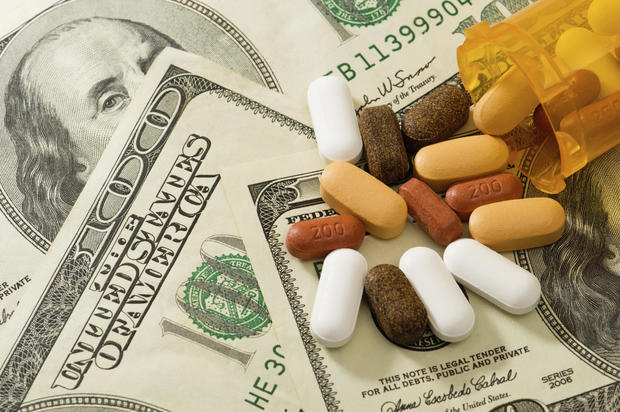How your drug plan co-pay can cost you money
So-called pharmacy benefit managers are supposed to work on behalf of their customers by negotiating lower prices for medications. Yet one industry practice is raising questions about whether consumers are getting a raw deal in the process.
Alleged “clawbacks” occur when consumers fill a prescription and hand the pharmacist their co-pay, which usually range from $10 to $20. When the medication is a generic or low-cost drug that costs less than that co-pay, the patient may not receive a price break because they’re still charged the co-pay, however.
Because they are under contract with pharmacy benefit managers (PBMs), pharmacists may be reluctant to tell patients when a lower-cost drug is available. Why? Because the difference between the medication’s actual cost and the co-pay is “clawed back” by the pharmacy benefit managers, according to lawsuits.
In other other words, both PBMs and pharmacists -- which in theory focus on the welfare of patients -- may have an incentive to withhold pricing information from consumers: PBMs to control costs, and pharmacists to ensure they keep the business they get from benefit managers.
Economists refer to this sort of problem, when one party to a contract or transaction has better information than the other -- think of buying a car before the internet made vehicle information readily available -- as “information asymmetry.”
Indeed, the allegations highlight the often opaque nature of the health care industry, where it can be difficult for patients to get information about the cost of their treatments. Given that spending on drugs is projected to jump almost 50 percent by 2020 to $640 billion, a lot of money is on the line.
“One the reasons this exists and how it can be perpetuated is because it isn’t transparent,” said Craig Raabe, an attorney who is representing clients who have sued companies including UnitedHealth Group (UNH), alleging violations of the Employee Retirement Income Security Act (ERISA) and the Racketeering Influenced and Corrupt Organizations Act (RICO).
In one example cited in a lawsuit filed by Raabe, a consumer paid a $50 co-pay to fill a prescription for Sprintec, a contraceptive. The patient wasn’t aware that her pharmacy had contracted to pay only $11.65 for the medication, which included tax and the pharmacist’s fee. The alleged clawback was $38.35.
UnitedHealth, which owns the pharmacy benefit manager Optum, disputes the allegations.
“Pharmacies should always charge our members the lowest amount outlined under their plan when filling prescriptions,” UnitedHealth said in a statement. “We believe these lawsuits are without merit, and will vigorously defend ourselves.”
The clawbacks occur when “the amount paid by a member under a member’s health plan is more than the amount that the plan’s pharmacy benefit manager pays the pharmacy for the prescription,” the company said. It added that pharmacists in the past had kept the difference, although the National Community Pharmacists Association (NCPA), which represents 22,000 independent pharmacies, disputed that.
Pharmacists don’t like the practice, but feel they aren’t able to inform their customers because of their contracts with the PBMs, said Susan Pilch, the vice president of policy and regulatory affairs at the NCPA.
“It’s the constant threat of being dropped from the network which is over the head of the pharmacist,” Pilch said. “A lot of them have broad clauses, such as the pharmacist should not speak damagingly or in any way that would reflect poorly on the PBM.”
Pharmacists are generally unhappy about the clawbacks, she added.
Consumers may feel the same way. PBMs were formed to help negotiate better prices for insurers and their patients. In the past few decades, they have become powerful intermediaries between patients, pharmacists, drug manufacturers and insurance companies. The three largest -- Optum, CVS Caremark and Express Scripts -- have generated tidy profits, but also raised questions about their effectiveness in keeping drug costs low.
UnitedHealth Group’s Optum says it manages prescription medications for 65 million people and processes 1 billion prescriptions each year. In 2016, Optum’s pharmacy revenue jumped 25 percent to $60.4 billion.
It’s unclear if customers can recoup the overpayments if they discover they were charged a co-pay above the drug’s price. Raabe said one of his goals is to recover the money for customers who have overpaid. While it’s unclear how many customers may have overpaid because of a clawback, he added, “Think of every day how many low-cost prescriptions are filled.”
One lawsuit notes that the clawbacks could impact such low-cost drugs including the anti-depression medication Prozac, the antibiotic amoxicillin and the pain medication Percocet, among others.
The Pharmaceutical Care Management Association, the national association for pharmacy benefit managers, said in a statement that patients “should not have to pay more than a network drugstore’s submitted charges to the health plan.”
Raabe said he’s hoping that the discovery process during the legal proceedings will identify exactly who is profiting from the practice, such as whether the pharmacy benefits manager or the insurer is taking the difference between the actual cost of the medication and the co-pay.
“We need to follow the flow of funds,” he said, adding that they haven’t yet seen the underlying contracts that govern the clawbacks.
At least 16 lawsuits have been filed since October, according to Bloomberg News. One pharmacy benefits consultant told the publication that the clawback practice is “like crack cocaine” to the industry.
A 2016 survey of pharmacists found that about 8 of 10 witnessed at least 10 clawbacks a month, according to the National Community Pharmacists Association. A majority said the practice affects both Medicare Part D and private insurance companies.
“There is an incredible lack of knowledge of how [PBMs] work,” Pilch said. “Most people don’t know that they have morphed into these huge conglomerates. They are in the middle of every drug transaction in the U.S.”
As for how to protect yourself from paying too much, Pilch said customers should ask the pharmacist what they would pay if they weren’t using a co-pay. While some pharmacists feel they can’t volunteer the information because of their contracts with the PBMs, they will talk about costs if the patient brings it up.
If a customer knows the drug is a generic, it’s especially important to ask.




